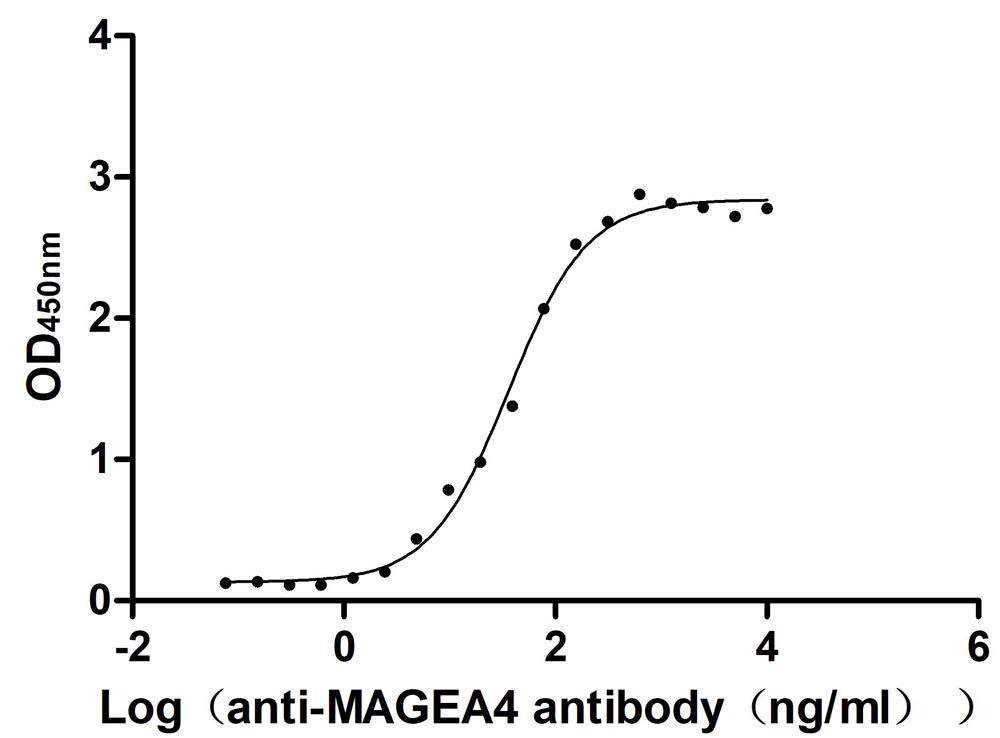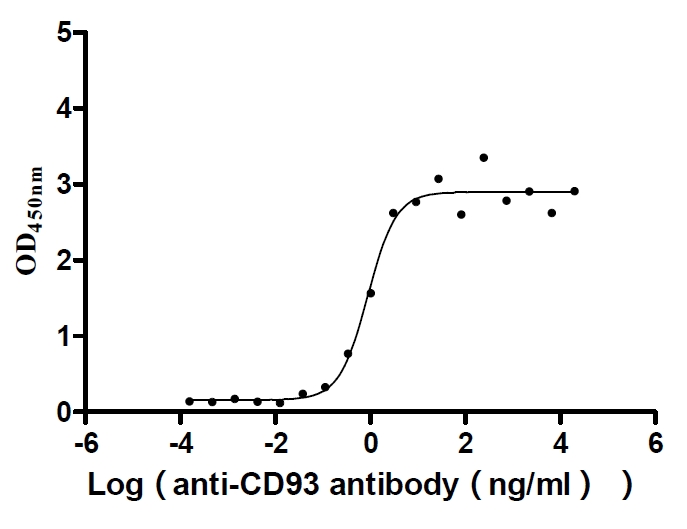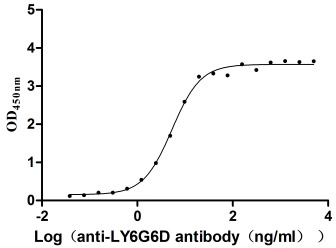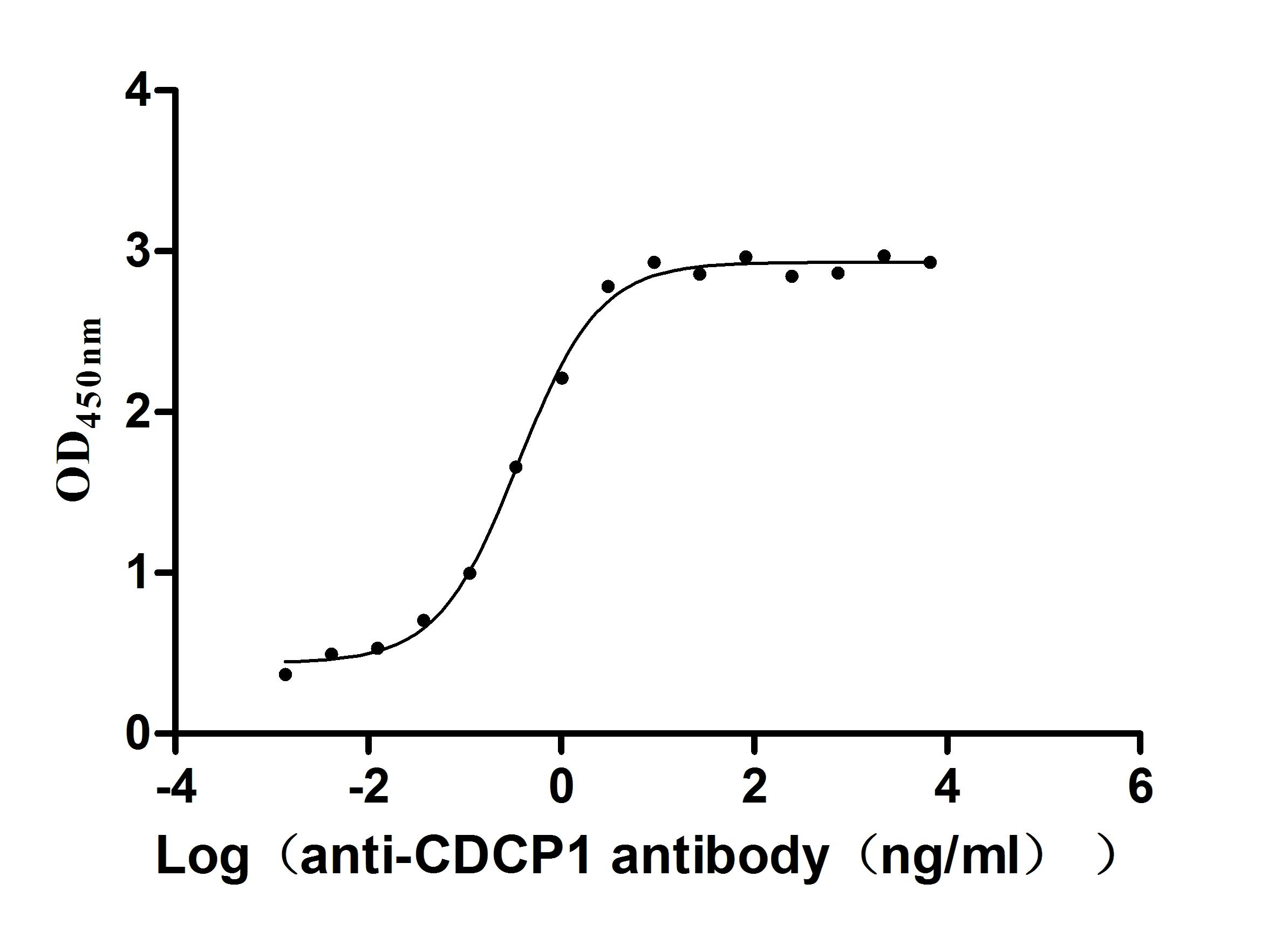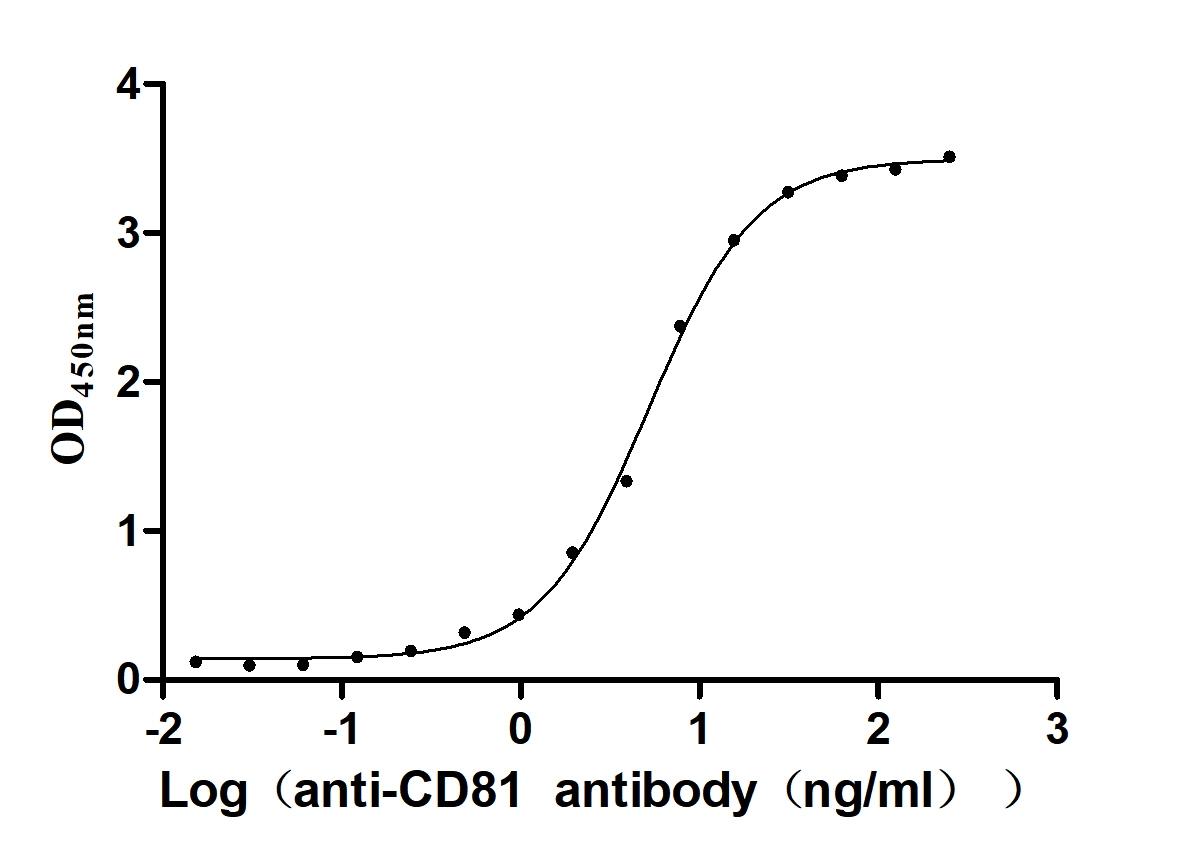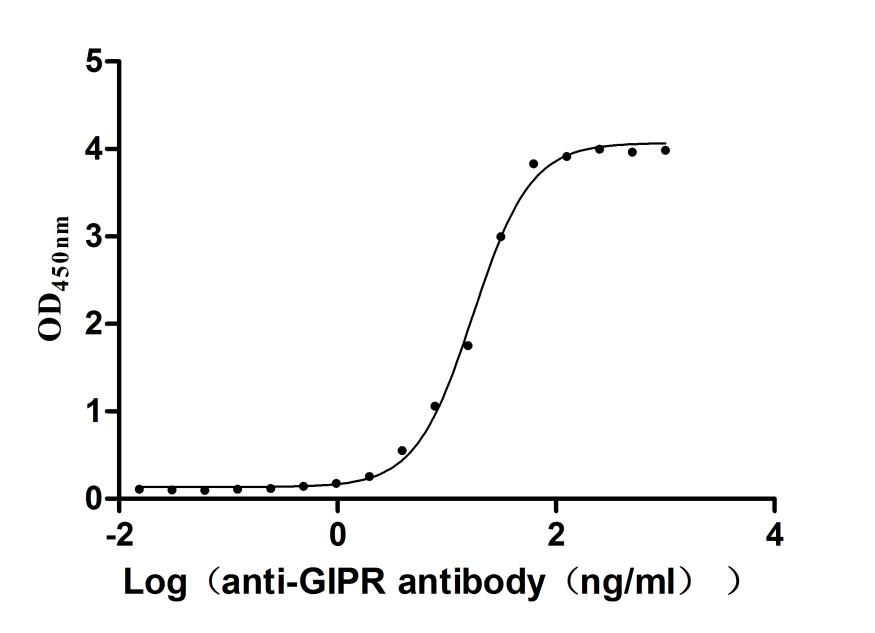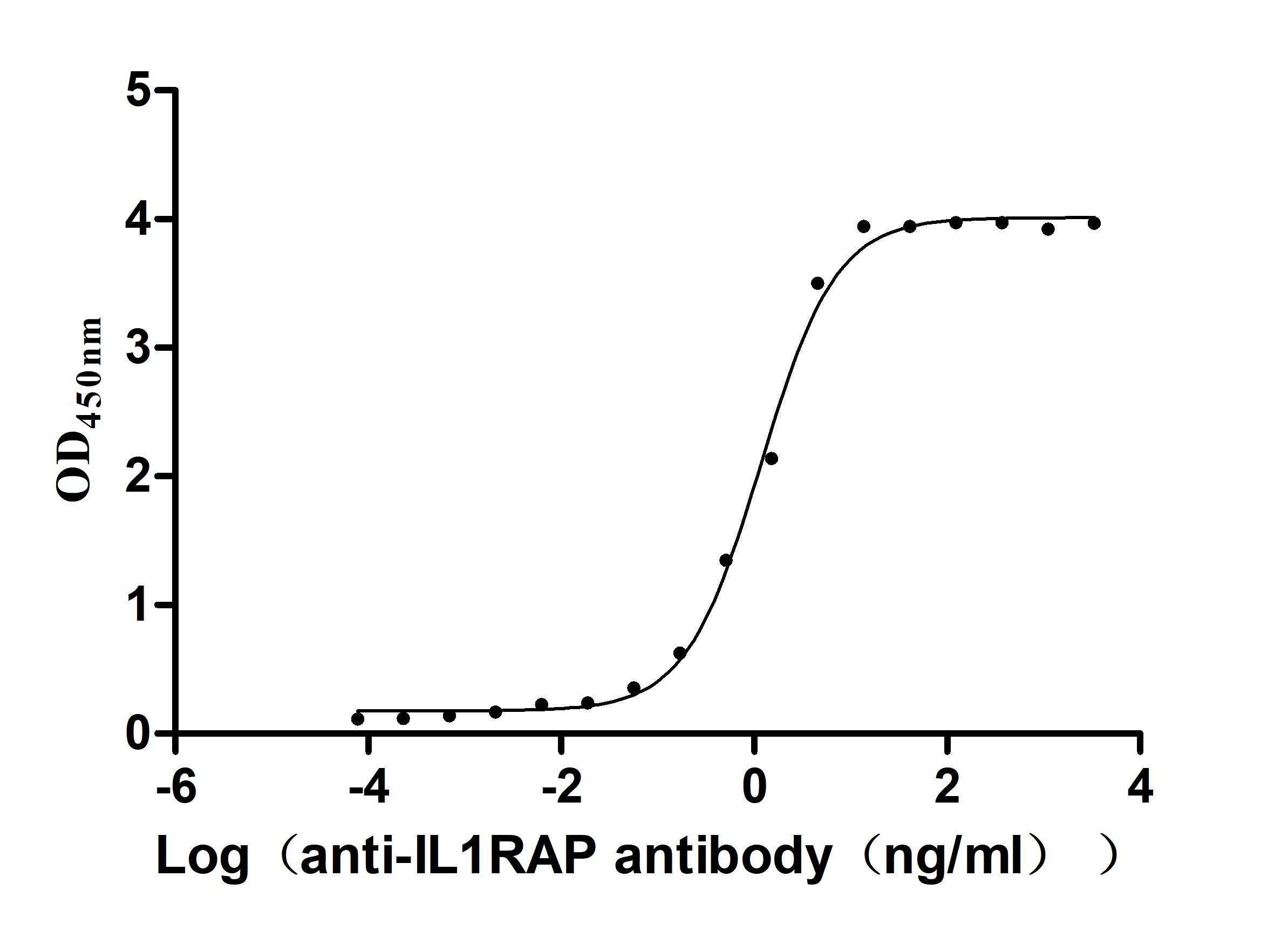Recombinant Human Small ubiquitin-related modifier 4 (SUMO4)
-
货号:CSB-YP718803HU
-
规格:
-
来源:Yeast
-
其他:
-
货号:CSB-EP718803HU-B
-
规格:
-
来源:E.coli
-
共轭:Avi-tag Biotinylated
E. coli biotin ligase (BirA) is highly specific in covalently attaching biotin to the 15 amino acid AviTag peptide. This recombinant protein was biotinylated in vivo by AviTag-BirA technology, which method is BriA catalyzes amide linkage between the biotin and the specific lysine of the AviTag.
-
其他:
-
货号:CSB-BP718803HU
-
规格:
-
来源:Baculovirus
-
其他:
-
货号:CSB-MP718803HU
-
规格:
-
来源:Mammalian cell
-
其他:
产品详情
-
纯度:>85% (SDS-PAGE)
-
基因名:SUMO4
-
Uniprot No.:
-
别名:dJ281H8.4; IDDM5; Small ubiquitin like modifier 4 protein; Small ubiquitin-like protein 4; Small ubiquitin-related modifier 4; SMT3 suppressor of mif two 3 homolog 2; SMT3 suppressor of mif two 3 homolog 4 (S. cerevisiae); SMT3H4; SUMO 4; SUMO-4; SUMO4; SUMO4_HUMAN
-
种属:Homo sapiens (Human)
-
蛋白长度:full length protein
-
表达区域:1-93
-
氨基酸序列MANEKPTEEV KTENNNHINL KVAGQDGSVV QFKIKRQTPL SKLMKAYCEP RGLSMKQIRF RFGGQPISGT DKPAQLEMED EDTIDVFQQP TGG
-
蛋白标签:Tag type will be determined during the manufacturing process.
The tag type will be determined during production process. If you have specified tag type, please tell us and we will develop the specified tag preferentially. -
产品提供形式:Lyophilized powder
Note: We will preferentially ship the format that we have in stock, however, if you have any special requirement for the format, please remark your requirement when placing the order, we will prepare according to your demand. -
复溶:We recommend that this vial be briefly centrifuged prior to opening to bring the contents to the bottom. Please reconstitute protein in deionized sterile water to a concentration of 0.1-1.0 mg/mL.We recommend to add 5-50% of glycerol (final concentration) and aliquot for long-term storage at -20℃/-80℃. Our default final concentration of glycerol is 50%. Customers could use it as reference.
-
储存条件:Store at -20°C/-80°C upon receipt, aliquoting is necessary for mutiple use. Avoid repeated freeze-thaw cycles.
-
保质期:The shelf life is related to many factors, storage state, buffer ingredients, storage temperature and the stability of the protein itself.
Generally, the shelf life of liquid form is 6 months at -20°C/-80°C. The shelf life of lyophilized form is 12 months at -20°C/-80°C. -
货期:Delivery time may differ from different purchasing way or location, please kindly consult your local distributors for specific delivery time.Note: All of our proteins are default shipped with normal blue ice packs, if you request to ship with dry ice, please communicate with us in advance and extra fees will be charged.
-
注意事项:Repeated freezing and thawing is not recommended. Store working aliquots at 4°C for up to one week.
-
Datasheet :Please contact us to get it.
相关产品
靶点详情
-
功能:Ubiquitin-like protein which can be covalently attached to target lysines as a monomer. Does not seem to be involved in protein degradation and may modulate protein subcellular localization, stability or activity. Upon oxidative stress, conjugates to various anti-oxidant enzymes, chaperones, and stress defense proteins. May also conjugate to NFKBIA, TFAP2A and FOS, negatively regulating their transcriptional activity, and to NR3C1, positively regulating its transcriptional activity. Covalent attachment to its substrates requires prior activation by the E1 complex SAE1-SAE2 and linkage to the E2 enzyme UBE2I.
-
基因功能参考文献:
- meta-analysis demonstrated that the G allele of the SUMO4 M55V polymorphism could be a susceptible risk locus to type 2 diabetes mellitus, mainly in the Chinese population, while the association in other ethnic population needs to be further validated PMID: 28494838
- Both donor and recipient SUMO4 rs237025 polymorphisms contribute to the development of new-onset diabetes mellitus after liver transplantation. PMID: 28689037
- Results show that SUMO-4 is expressed in normal placental development. SUMO-4 expression was increased in pre-eclamptic placentas and in models of oxidative stress and hypoxic injury suggesting that SUMO-4 hyper-SUMOylation may be a potential post-translational mechanism in the stressed pre-eclamptic placenta. PMID: 28545138
- study suggests that SUMO4 c.163 G to A polymorphism is associated with the susceptibility to diabetic nephropathy in north Indian subjects with type 2 diabetes PMID: 27055882
- SUMO4 M55V polymorphism and type-2 diabetes were significantly associated with a possible SUMO4 region to type-2 diabetes susceptibility. PMID: 25189908
- No association between SUMO4 gene polymorphisms and acoronary artery disease with and without type 2 diabetes mellitus. PMID: 23042402
- SUMO4 Met55Val variant was associated with increased insulin resistance in Chinese patients with newly diagnosed type 2 diabetes. PMID: 21671169
- study demonstrates significant associations of SUMO4 M55V polymorphism with type 1 diabetes mellitus in Asian and Caucasian population and with type 2 diabetes mellitus in Asian population PMID: 22936652
- The C438T polymorphism in the SUMO4 gene is associated with significantly increased risk of papulopustular skin lesions in HLA-B51-positive Behcet's disease patients. PMID: 21901353
- This meta-analysis indicates that the SUMO4 M55V polymorphism confers susceptibility to type I diabetes in Asians and Europeans. PMID: 22884980
- the association between small ubiquitin-like modifier 4 (SUMO4) gene polymorphisms and type 2 diabetes mellitus PMID: 22425950
- Letter: report SUMO4 polymorphisms associated with protective effect in Tunisian rheumatoid arthritis patients. PMID: 21906435
- The SUMO4 gene single nucleotide polymorphism variant is not associated with susceptibility of the type 2 diabetes polymorphism. PMID: 20728233
- SUMO4 gene polymorphisms may be involved in the development of skin lesions, vascular Behcet's disease, as well as the severity of the disease. PMID: 20868570
- SUMO4 gene M55V variant is associated with the genetic susceptibility of type 1 diabetes mellitus (T1D) in Chinese children. PMID: 21158221
- This study suggests that in Taiwan the SUMO4 Met 55Val polymorphism is associated with susceptibility to T2DM and Type 2 diabetic patients with GG genotype have worse glycemic control. PMID: 19915388
- Observational study of gene-disease association. (HuGE Navigator) PMID: 20728233
- Observational study of gene-disease association, gene-environment interaction, and pharmacogenomic / toxicogenomic. (HuGE Navigator) PMID: 20448286
- Meta-analysis of gene-disease association. (HuGE Navigator) PMID: 20518843
- total of 2317 families were genotyped for 15 SNPs in the SUMO4 region. PMID: 19956095
- we report evidence for an association between T1D and multiple single-nucleotide polymorphisms in 197 kb of genomic DNA in the IDDM5 interval. PMID: 15247916
- SUMO4 sumoylation may play an important role in the regulation of intracellular stress PMID: 16236267
- The M55V polymorphism was significantly associated with type 1 diabetes in Asian populations . PMID: 16306380
- results indicate that the small ubiquitin-like protein 4(SUMO4) is a more common autoimmune disease gene and a supplementary risk factor to type 1 diabetes PMID: 16735488
- SUMO4 SNP did not significantly influence predisposition to and features of rheumatoid artritis, in contrast to previous genetic and functional evidence that suggested its involvement. PMID: 16755651
- Genetic and functional evidence is provided supporting SUMO4 as a type 1 diabetes mellitus susceptibility gene. PMID: 17130563
- No significant association was found between SUMO4 M55V and LADA. PMID: 17130565
- SUMO4 gene methionine-valine variant is associated with severity of diabetic nephropathy in patients with type 2 diabetes. PMID: 17229939
- Our results show that Asian-Indians with T1DM are different from other Asian populations. Asian-Indians show more similarity to Caucasians with respect to the association of SUMO4 M55V variant in T1DM. PMID: 17373940
- contribution of the SUMO4 Met55Val polymorphism to both type 1 and type 2 diabetes susceptibility in the Japanese population PMID: 17374705
- SUMO4 protein appears to be either in extremely low abundance in human kidney or HEK293 cells or it is not present at all.It remains possible that SUMO4 protein is more abundant in other cell types or can be induced by hormonal or environmental challenges PMID: 17459725
- we conclude that SUMO4 M55V is associated with type I diabetes melitus in association with high-risk HLA-DR3 and DR4, but not by itself. PMID: 17554341
- study of the prevalence of four polymorphisms,CTLA-4 -318 C/T, 159 C/T, 3' STR and SUMO4 163 AG in latent autoimmune diabetes in adults; no association with either of the polymorphisms has been found PMID: 17558709
- reported a positive association of the SUMO4 M55V variant with diabetic nephropathy in an Asian cohort of 430 patients with type 2 diabetes PMID: 17660269
- data indicate that the M55V polymorphism in the small ubiquitin-like protein 4(SUMO4) gene is associated with a reduced risk of diabetic retinopathy in type 1 diabetes PMID: 17926234
- we will update the genetic evidence supporting SUMO4 as a T1D susceptibility gene and discuss the possible explanations for the discrepant associations observed in Caucasians vs Asians.[review] PMID: 17990297
- no associations of the SUMO4 rs237025 A>G polymorphism with the susceptibility of psoriasis were detected. PMID: 18330586
- SUMO4 +438 C allele is associated with susceptibility to Behcet's Disease (BD) in HLA-B51 negative Chinese Han patients, while the AGAT haplotype is protectively associated with BD in HLA-B51 negative patients PMID: 18657476
- These data not only confirmed previously published data, but also provided additional evidence suggesting a role for SUMO4 sumoylation in the regulation of intracellular stress. PMID: 18708028
- This study examines whether small ubiquitin-like modifier 4 (SUMO4) polymorphisms were associated with Vogt-Koyanagi-Harada (VKH) syndrome in the Chinese Han population. PMID: 19122825
- SUMO4 may act as a negative feedback regulator to prevent excessive activation of NFkappaB. PMID: 19222990
- Association of the polymorphism of SUMO4 with risk of coronary heart disease in type 2 diabetes is suggested. PMID: 19410319
- Observational study of gene-disease association. (HuGE Navigator) PMID: 19915388
- Observational study of gene-disease association. (HuGE Navigator) PMID: 19410319
- Observational study of gene-disease association. (HuGE Navigator) PMID: 19122825
- Observational study of gene-disease association and gene-gene interaction. (HuGE Navigator) PMID: 18466472
- Observational study of gene-disease association. (HuGE Navigator) PMID: 18466531
- Observational study of gene-disease association. (HuGE Navigator) PMID: 18330586
- Observational study of gene-disease association. (HuGE Navigator) PMID: 12901503
- Observational study of gene-disease association. (HuGE Navigator) PMID: 15730420
显示更多
收起更多
-
蛋白家族:Ubiquitin family, SUMO subfamily
-
组织特异性:Expressed mainly in adult and embryonic kidney. Expressed at various levels in immune tissues, with the highest expression in the lymph node and spleen.
-
数据库链接:
HGNC: 21181
OMIM: 600320
KEGG: hsa:387082
STRING: 9606.ENSP00000318635
UniGene: Hs.657168
Most popular with customers
-
Recombinant Human Melanoma-associated antigen 4 (MAGEA4) (Active)
Express system: Mammalian cell
Species: Homo sapiens (Human)
-
Recombinant Human Complement component C1q receptor (CD93), partial (Active)
Express system: Mammalian cell
Species: Homo sapiens (Human)
-
Recombinant Macaca fascicularis lymphocyte antigen 6 family member G6D (LY6G6D) (Active)
Express system: Yeast
Species: Macaca fascicularis (Crab-eating macaque) (Cynomolgus monkey)
-
Recombinant Human CUB domain-containing protein 1 (CDCP1), partial (Active)
Express system: Mammalian cell
Species: Homo sapiens (Human)
-
Recombinant Human CD81 antigen (CD81), partial (Active)
Express system: Mammalian cell
Species: Homo sapiens (Human)
-
Recombinant Human Gastric inhibitory polypeptide receptor(GIPR),partial (Active)
Express system: Mammalian cell
Species: Homo sapiens (Human)
-
Recombinant Human Cadherin-1(CDH1),partial (Active)
Express system: Mammalian cell
Species: Homo sapiens (Human)
-
Recombinant Human Interleukin-1 receptor accessory protein (IL1RAP), partial (Active)
Express system: Mammalian cell
Species: Homo sapiens (Human)


